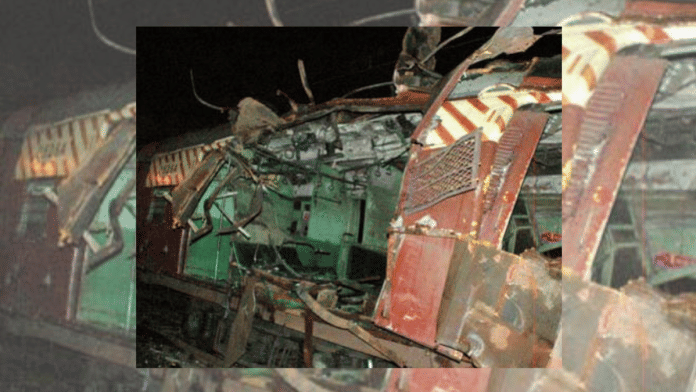Mumbai: The Bombay High Court has acquitted all the 12 men convicted in the 7/11 Mumbai train blasts case of 2006, overturning a 2015 verdict by a special court that had awarded death penalty to five and life terms to the other seven.
The bench comprising Justices Anil Kilor and Shyam Chandak asserted that the prosecution had “utterly failed” to prove the case beyond reasonable doubt, and found the statements of the prosecution witnesses unreliable. The court questioned the authenticity of witnesses’ statements, asking how they remembered the accused about 100 days after the blast, when their statements were recorded.
After the unexpected verdict from the high court, the state government now may challenge it and move the Supreme Court.
ThePrint tried to reach Advocate Yug Chaudhry, one of the lawyers of the convicts, but he declined to comment.
On 7 July, 2006, blasts had rocked the first class compartments of seven local trains in Mumbai’s western suburbs within the span of 11 minutes, leaving 187 dead and 829 injured.
Special public prosecutor and BJP Rajya Sabha nominee Ujjwal Nikam told media persons, “If this evidence doesn’t stand in high court, then who is responsible for it? Was the investigation flawed? Or was the evidence wrong? What happened? The post mortem of this will take place in the days to come. But today’s acquittal is quite serious, and I am confident the government will appeal against this in the Supreme Court.”
The pressure for the Maharashtra government to move the top court is mounting, with even BJP leaders appealing to Chief Minister Devendra Fadnavis to do so.
Senior BJP leader Kirit Somaiya told media persons, “This verdict is very shocking. There might be some shortcomings in legal representation, investigation of this 2006 case. These terrorists need to be given capital punishment. I have already appealed to the chief minister to form a good legal team, and challenge this in the Supreme Court. Mumbai deserves justice.”
A total of 13 men were charged in the case under Indian Penal Code (IPC) provisions pertaining to murder and criminal conspiracy, Maharashtra Control of Organised Crime Act (MCOCA), 1999, and the Unlawful Activities (Prevention) Act (UAPA), 1967.
The prosecution had alleged that the plan was hatched by Lashkar-e-Taiba (LeT) in Pakistan, and was executed with the help of members of the banned Students Islamic Movement of India (SIMI).
In 2015, a special court in Mumbai had convicted 12 of the accused. In its 1,839-page long verdict, it awarded five of these convicts—agreeing with the public prosecutor who called them ‘merchants of death’—death sentences, and the rest were handed life terms.
The five given the death penalty were Kamal Ahmed Mohd Vakil Ansari, Faisal Ataur Rahman Shaikh, Ehtesham Qutubuddin Siddiqui, Naveed Hussain Khan and Asif Khan—all convicted for planting the bombs.
The other seven convicted were Tanveer Ahmed Mohammed Ibrahim Ansari, Mohammed Majid Mohammed Shafi, Shaikh Mohammed Ali Alam Shaikh, Mohammed Sajid Margub Ansari, Muzammil Ataur Rahman Shaikh, Suhail Mehmood Shaikh and Zameer Ahmed Latiur Rehman Shaikh.
Only Abdul Wahid Din Mohammad Shaikh was acquitted during the trial. Shaikh had been charged with harbouring some of the accused after they had planted the bombs, but was granted the benefit of doubt as the court had felt that the allegations against him had not been proven.
“I am extremely happy. All the relatives and the accused persons had tears of joy. The judgment comes after 19 years. Our claim that we were all framed has been proven right today,” Shaikh told ThePrint.
After the 2015 verdict, the 12 had challenged it in the high court, which was also hearing the confirmation of death sentences. Death penalties have to be confirmed by the relevant high court after a trial court awards them. The high court held hearings in the matter from July 2024 to January this year.
(Edited by Mannat Chugh)
Also Read: Are 5 on death row for Mumbai 7/11 blasts guilty? NIA/police files reveal contradictory facts






